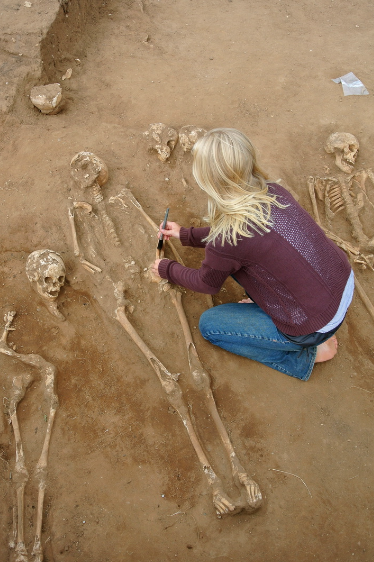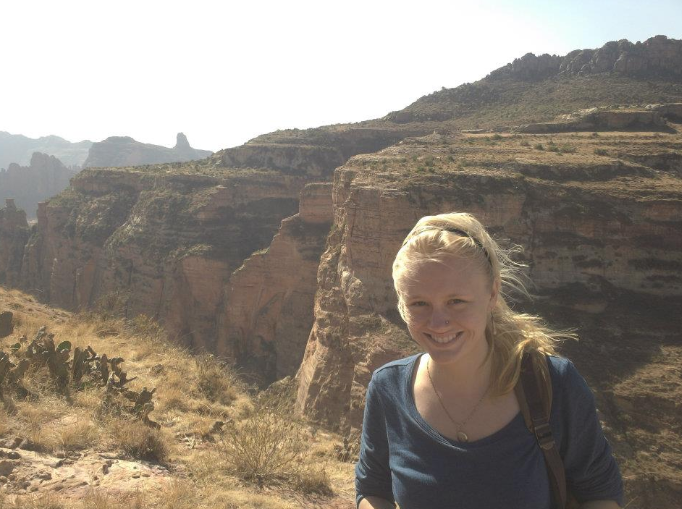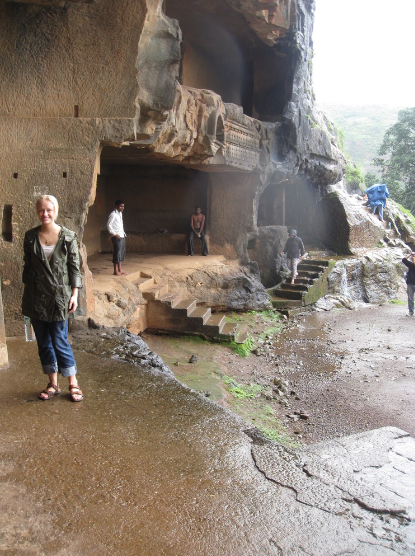Archaeology.. the term makes me think of Indiana Jones. That shows my age, doesn’t it? Well, as hard as it may be to believe, that’s not real life. However, I know someone who’s living the adventure (without the bullwhip).
Chatfield native Paige Brevick is living what can only be called an adventurous life. She’s a recent graduate of the University of Memphis with a master’s degree in Egyptian Art and Archaeology. Brevick has worked in faraway places like India and Israel over the course of her studies and will continue globe-hopping when she studies for her doctorate at the University College London in England. How does a small-town girl from Chatfield get to travel the world as she studies to be an archaeologist?

“That’s a really good question,” she said with an infectious laugh. “A lot of people ask me that. I’ve always loved the stories that objects tell about people and the cultures that made those items. As a kid, I was interested in arts, museums, the outdoors, and that sense of adventure, so archaeology seemed like a natural career choice.”
Brevick said she had no idea that archaeology was a “real job you could have” until she got to college. While growing up as a youngster in Chatfield, her parents took her to a lot of different museums. She describes herself as “always excited” to turn the corner in a museum and find an Egyptian gallery or see some Asian art. “That’s where the curiosity got started,” she said.
Archaeology Studies Begin
Her secondary education started at Cornell College in Mt. Vernon, Iowa. “My degree there was in Religion and I spent a lot of time studying the Hebrew Bible. It was in those early religion classes that I became interested in Near Eastern archaeology. Even though my degree was in religion, I got to study abroad quite a bit.
“I lived in India for a while,” she recalled. “After that, I studied public archaeology and what the community involvement was in museums across Maharashtra and South India. I saw people there who were passionate about their heritage and where they came from. It was a great place to It was a great place to study because India is full of ancient sites, temples, and history.”
A lack of what she called archaeological “site management” triggered an interest in protecting those sites and the antiquities that were being found. The trip to India was her first journey overseas and eye-opening in many different ways. What was it like for a Midwestern gal to step off the plane into a foreign country for the very first time?

“It was exhilarating,” she said with a giggle. “It’s quite a country to jump into for my first overseas experience. It’s overwhelming because Mumbai is so loud. The city was so loud and packed with people. It’s not a surprise that it was more people than I’d seen in my entire life.”
The trip to India triggered her interest in a career in “heritage management,” which she’s currently working in. She says it’s all about the running of an archaeological site and how to go about involving the community in that preservation. Rather than having archaeologists come into the site and then leave, it’s about how to create something sustainable with the community. Brevick hopes to facilitate relationships between archaeologists, museums, and communities.
Masters degree in archaeology
She recently wrapped up a three-year stay at the University of Memphis, her second stop in secondary education. Brevick said it’s one of the few programs in the country that offer a master’s degree in Egyptian studies and archaeology. Egypt is a major part of her long-term interest in studying the near East. Brevick’s acquired some unique skills while studying for her master’s degree.
“I got to study hieroglyphs,” she said. “I can now read Middle Egyptian, which are the glyphs you may see on objects or in museums. It took a lot of time and practice to learn Middle Egyptian, but it’s really been rewarding. You really don’t meet a lot of people who can say they’ve learned hieroglyphs.”

Brevick has had a couple of opportunities to head to Egypt and see things firsthand. In a case of real life getting in the way, one of her trips was canceled because of safety concerns. Brevick found out firsthand that she’ll have to be “flexible” to succeed as an archaeologist. Funding issues can cause challenges, as can real-world dangers on the ground. Even after all the delays, she’s hopeful of getting to Egypt within the next year.
She’s lived for a short time in other places overseas, including Ethiopia. “I was there doing a study abroad class through Cornell,” she recalled. “We traveled all over the country and visited several sites, including the rock-hewn churches in Lalibela. I also lived in the Bahamas for a month and studied anthropology.”
Digging up plague victims
Personally, her most interesting experience to date took place in England. “I was just a student and only stayed there for a couple of weeks,” Brevick said. “I got to work on a black plague mass-burial site at Thornton Abbey. It’s so different from what I normally do but I wanted some bio-archaeology experience.
“The site was very unusual because we don’t normally find mass burial sites,” she added. “In this case, there were about 50 bodies buried there. It was a very humbling experience because you saw what the community had been through. They were hit so hard by the plague.”
The adventure will soon continue in London, where she’s off to study for her Ph.D. Brevick was there for a short time last year to interview with the faculty at the school and found the experience a little overwhelming because of the “hustle-and-bustle of the city.” She said this is her next step in a new adventure.

“I’ll be at University College London,” she explained. “They were just ranked third in the world when it comes to archaeological studies. I’ll be working on a heritage management project which will be launched in Egypt. My doctoral dissertation will identify and develop co-creative heritage management strategies. I’m really interested in the relationships between archaeologists, museums, and the local communities they are working in and for.
“Rather than only advocate for more community engagement,” she said, “I think museums have a responsibility to go into their communities and ask community leadership what it is they need from the museum.”
Career goals in archaeology?
After all the education is finally finished, what are her long-term career goals?
“I think I’d like to stick with museums,” Brevick said. “I think that’s perfect for my personality. Anything that would allow me to continue advocating for archaeology cultural heritage. I feel honored and grateful to be doing what I’m doing.”
